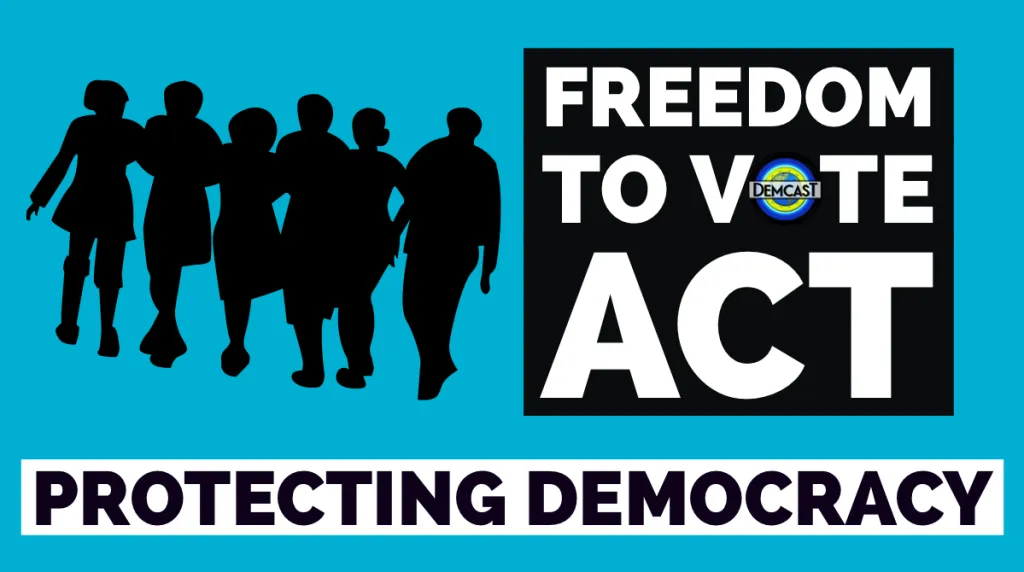This week, Senate Democrats unveiled a new voting rights bill that trims down and adjusts what was previously proposed in the For the People Act, which was passed by the House in March. This post provides a detailed summary of what’s in the proposed Freedom to Vote Act.
The bill is divided into three key sections:
- Voter Access and Election Administration
- Election Integrity
- Civic Participation and Empowerment
Here is the full text of the bill. Section 1 is broken out below.
Section 1: Voter Access and Election Administration
This section includes provisions to advance voter access by implementing reliable state best practices for voter registration and election administration, to ensure all Americans can easily exercise their freedom to vote regardless of where they live.
Key Provisions include:
Automatic Voter Registration and Online Voter Registration
- Enacts an automatic voter registration system for each state through the state’s motor vehicle agency and ensures voters in all states have access to online voter registration.
- Allows for Pre-registration for 16 year olds
- Includes data protection for domestic violence victims
Election Day Holiday
- Makes Election Day a public holiday.
Uniform Early Voting
- Ensures voters have access to at least 15 consecutive days of early voting for federal elections, including two weekends, while accommodating small election jurisdictions and vote-by-mail jurisdictions.
- 10 hours each weekday, with hours before 9 AM and after 5 PM
- 8 hours each weekend day
- Creates exceptions for jurisdictions with under 3,000 registered voters
- Requires polling locations to be within walking distance of public transportation
- Requires at least 1 polling location on all college campuses
- Requires enough machines/poll workers so that no voter waits over 30 minutes to vote
- Prohibits states from banning curbside voting
Same Day Voter Registration
- Ensures every state offers same day registration at a limited number of locations for the 2022 elections and at all polling locations by 2024, allowing election officials, especially in rural areas, time to implement the new requirements.
Federal Minimum Standards on Vote by Mail and Drop Boxes
- Ensures all voters can request a mail-in ballot, improves the delivery of election mail, and puts in place minimum standards to ensure drop boxes are available and accessible to all voters.
- Prohibits requirement to send copy of ID for VBM
- Removes witness/notarization requirements
- Standardizes Signature Requirements for VBM Ballots and allows for ballot curing
- If a signature is deemed a non-match (which must be verified by 2 separate election officials (one from each major party), must notify voter by mail, phone, text or email and offer them a chance to cure (which is valid for 3 days after the deadline for receiving ballots)
- If the signature is left blank or there is another defect, the above notifications and chance to cure are applicable
- Requires disclosure of the total number of discarded ballots
- Requires all states to carry out a program to track and confirm receipt of ballots
- Requires all states to provide information on whether the ballot was accepted, or if was rejected, to provide the reason why
- Systems must be available both online and with a toll free number
- Allows states to start processing ballots 14 days prior to an election
- Requires post office to process and clear ballots on the day they arrive at the post office
- Requires all ballots have a post mark by the post office
- No postage requirements for ballots
- Drop Boxes
- Requires drop boxes to be accessible 24 hours a day
- Requires 1 drop box for every 45,000 registered voters OR 1 drop box for every 15,000 voters that voted by mail last election
Strengthens Voter List Maintenance Standards
- Requires that the removal of voters from the rolls is done on the basis of reliable and objective evidence and prohibits the use of returned mail sent by third parties to remove voters.
Counting of Provisional Ballots
- Requires provisional ballots to count for all eligible races within a county, regardless of the precinct they were cast in. Prohibits states from imposing any additional requirements to cast a provisional ballot
Standards for Voter Validation
- Promotes voter confidence and access by requiring a uniform national standard for states that require identification for in-person voting, and allowing voters to present a broad set of identification cards and documents in hard copy and digital form. Cited cards and documents in the bill:
- State Issued ID
- Passport
- Employee ID Card from state or Federal government
- Tribal ID
- Student ID
- Military ID
- Gun License/ Concealed Carry permit
- Medicare Card
- Social Security Card
- Birth Certificate
- Voter Registration Card
- Hunting/Fishing License
- SNAP card
- Bank/Debit Card
- Utility Bill
- Lease
- Bank Statement
- Health Insurance Card
Voting Rights Restoration for Returning Citizens
- Restores the right to vote in federal elections for people who have served their time for felony convictions after they are released from prison.
Expanded Voting Access Protections for the Disabled, Native Americans, Military, Overseas Voters, and Underserved Communities
- Includes targeted protections to promote accessible voting to communities facing unique challenges.Includes protections for individuals subject to guardianship, unless a court rules otherwise
- Voting on Tribal Land
- Drop boxes must be made available on Tribal Lands in consultation with the Tribal Leaders
- Tribes can designate buildings as ballot pick up and/or collection locations
- Tribal Leaders can designate a building to be used as official residential addresses and mailing addresses
--30--
Cross-posted from Demcast USA. Section 2 (of 3) coming tomorrow.







